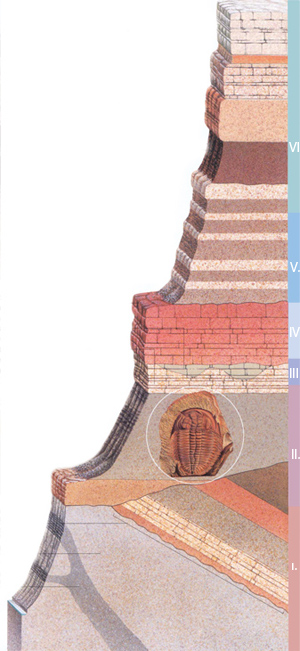Charles Darwin
Perhaps the greatest problem that he (Darwin) had to tackle was the means by which adaptive characteristics were passed on from generation to generation, for the principles of genetics were still to be discovered at the time of Darwin's death. A second problem he could not resolve related to the nature of the fossil record.1
 Charles Darwin |

I.Permian, II. Younger Carboniferous, III. Ollder Carboniferous, IV. Devonian V. Cambrian, VI. Precambrian
Fossils are one of the main sources of information about the different periods in the Earth's history. They provide information not just about natural history, but about the history of the Earth itself. Specific types of fossil are found only in specific strata and in specific types of sedimentary rock. Fossil groups are unique to each consecutive rock stratum and represent a form of signature of that stratum, enabling paleontologists to date it accurately.
Darwin gave the name of the "theory of evolution" to the hypothesis he developed, on the two expectations described by Douglas Ward in the extract cited above.
His first assumption was that the genes that give rise to different characteristics could be transmitted, in some imaginary manner, to subsequent generations, thus resulting in changes between species. His other surmise was that this series of imaginary changes would be preserved in the fossil record.
It was easy for Darwin to claim that changes occurred in a living thing's anatomical features that were then transmitted to subsequent generations, eventually resulting in a new species. The mid-1800s, when Darwin produced his ideas, were a relatively "primitive" time scientifically. The study of genetics had not yet come into existence. The complexity of the cell and its chromosomes, let alone DNA, had yet to be discovered. The glorious structure of the genes that determine all of a living thing's characteristics, the data contained by those genes and the sensitivity within them were all still completely unknown.
It was also easy for Darwin to trust that fossil record existing somewhere in the world would eventually confirm these hypothetical changes among species. According to his claims, intermediate form fossils did exist in the geologic layers, but had simply not yet been unearthed. At his time, the number of fossil specimens extracted from rocks was still very limited. Since no intermediate forms had as yet appeared, Darwin expected that one day in the future, people would start discovering these imaginary "missing links." All that was required was enough time and detailed studies to be carried out.
Darwin founded his theory on these two basic assumptions, but close inspection reveals no evidence or observation—because essentially, the theory of evolution was advanced for totally ideological reasons, not scientific ones. It was developed in order to turn people away from their faith in God and to offer them an alternative to the fact of Creation. It was an adaptation to natural history of the materialist logic being disseminated across the globe with that aim in mind. That the theory was being proposed in the name of science was accepted, again due to the primitive state of science at the time. The claim's illogicality was plain to see, but under the scientific standards of the era, evidence that would reveal the theory's entire lack of proof had not yet been understood.

The fossil record also represents a major disappointment for latter-day Darwinists. None of the intermediate form fossils that Darwin expected to be discovered some day in the future has actually been unearthed. The idea that the fossil record is "inadequate" is now no longer part of the Darwinist credo, because the Earth has yielded up almost all existing specimens. A large part of the planet has been investigated, and paleontology reveals that in fact, there is not one single example of a "transition." Living things that existed hundreds of millions of years ago have never changed in all that time.
The late Harvard University evolutionist paleontologist Stephen Jay Gould openly states that Darwin was in fact aware of this. As he wrote, "The fossil record had caused Darwin more grief than joy.".2The evolutionists Niles Eldredge and Ian Tattershall, of the American Museum of Natural History, have described their position in these terms:
... That individual kinds of fossils remain recognizably the same throughout the length of their occurrence in the fossil record had been known to paleontologists long before Darwin published his Origin. Darwin himself, . . . prophesied that future generations of paleontologists would fill in these gaps by diligent search . . . One hundred and twenty years of paleontological research later, it has become abundantly clear that the fossil record will not confirm this part of Darwin's predictions. Nor is the problem a miserly fossil record. The fossil record simply shows that this prediction is wrong.

In short, Darwin arrived at his theory of evolution by deliberately ignoring all these impossibilities, even though they were known well enough at the time. There is no scientific possibility of useful genetic changes taking place by way of random effects on species, or of them being transmitted on to subsequent generations. Fossils do not reveal any such changes, and exhibit not even a single one of all the hypothetical intermediate forms that should have existed over the course of hundreds of millions of years.
That being the case, what scientific evidence keeps the theory of evolution alive?
There is none! This once again shows that the reasons to support Darwinism are ideological, rather than scientific. The scientific protocol requires that a hypothesis should first be stated, and then turned into a law only after proofs are supplied. However, this does not apply to evolution, where there is not a single piece of evidence to support the theory. Nonetheless, it still maintains its place in textbooks and still appears in the media, in highly misleading reports. It is protected by laws and preserved through the logic of "it is immutable, and no decision against it can be made." The sole reason for this is that the theory of evolution is a dogmatic belief, not a scientific thesis.

The fossil record constantly refutes Darwinism's claims and points to the fact of Creation. All Darwinists' efforts to prove otherwise have ended in failure. The evidence in the sedimentary rocks documents and clearly declares that living things never underwent evolution. Two of the greatest proofs of this are—again—the absence of any intermediate form fossils and the stagnant "stasis" in the fossil record itself.